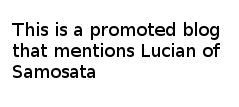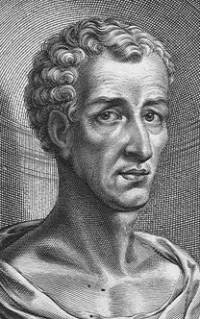Lucian of Samosata (2nd cent AD) True Story
By strange-complex
And now that I am finally up to date with film reviews and Doctor Who reviews, I can turn my attention once again to my much-neglected book reviews.
I should have read this one years ago, given that I'm a Classicist who loves stories of a fantastical nature, but it took me until 2011 to finally get round to it. And what a fool I was to wait so long, because it is completely ace! I knew that it involved the narrator going on a voyage to the moon, and for that reason has often been viewed as the first (surviving) SF story - but actually he and his companions travel through a whole series of wondrous settings. These include an island with rivers of wine, a giant whale so huge that there are colonies of people living inside its stomach, an island made of cheese, the Isle of the Blest full of Greek heroes, philosophers and writers, Calypso's island, an island inhabited by people with the heads of bulls, an island full of cannibalistic witches and finally a mysterious new transAtlantic continent which he promises to describe - but never does.
In its own time this was probably conceived as a satire on stories of epic voyages like the Odyssey and the Argonautica, so the settings which the narrator experiences are basically an exaggerated parody of places like the island of the Lotus Eaters, Circe's island, the all-female society of Lemnos, or the land of the six-armed giants in those works. Lucian knits his fantastical settings together using the same epic voyage format, but marks his work out as satire by declaring up-front that the entire story is a bunch of lies. This has kept scholars busy discussing ancient conceptions of the relationship between 'fiction' and 'lies' ever since (to little purpose in my view).
Reading from a modern perspective, I found that the succession of wondrous lands full of strange people reminded me more than anything of the Wizard of Oz series. That may simply be because the very lively and engaging translation which I read was published in 1913, though - i.e. right in the middle of the period when L. Frank Baum was writing the original Oz series (1900-1920). Certainly, almost any modern SF series which involves a core group of travellers visiting a succession of fantastical places could be compared to this, including Star Trek, Doctor Who and The Hitch-Hikers' Guide to the Galaxy (which incorporates the satirical element as well) and no doubt many more. Indeed, just as this work in itself relates closely to the Odyssey, the Argonautica et sim., so too do modern works of SF using the same basic voyage format - as Ray Harryhausen surely knew when he closed the circle by positioning Jason and the Argonauts as an SF film. Genres overlap and inform one another, and everything is intertextual.
From the translation I read at least, I can also say that this was a genuinely good read - funny, inventive, and (precisely because it is so fantastical) not really requiring any particular knowledge of the ancient world to 'get' the jokes. The Isle of the Blest section might drag a bit for non-Classicists, because that includes topical humour about particular heroes and thinkers - e.g. Ajax, Theseus and Menelaus, Alexander and Hannibal, Homer, Aesop, Diogenes the Cynic and so forth. But even there the basis of most of the jokes is pretty clear from the context. Otherwise, I can highly recommend this book to anyone - especially since it is available for free right here, and is only the equivalent of a couple of chapters from a modern novel long.
strange-complex. “Lucian of Samosata (2nd cent AD) True Story.” 06/23/2013. <http://strange-complex.livejournal.com/469095.html>.

